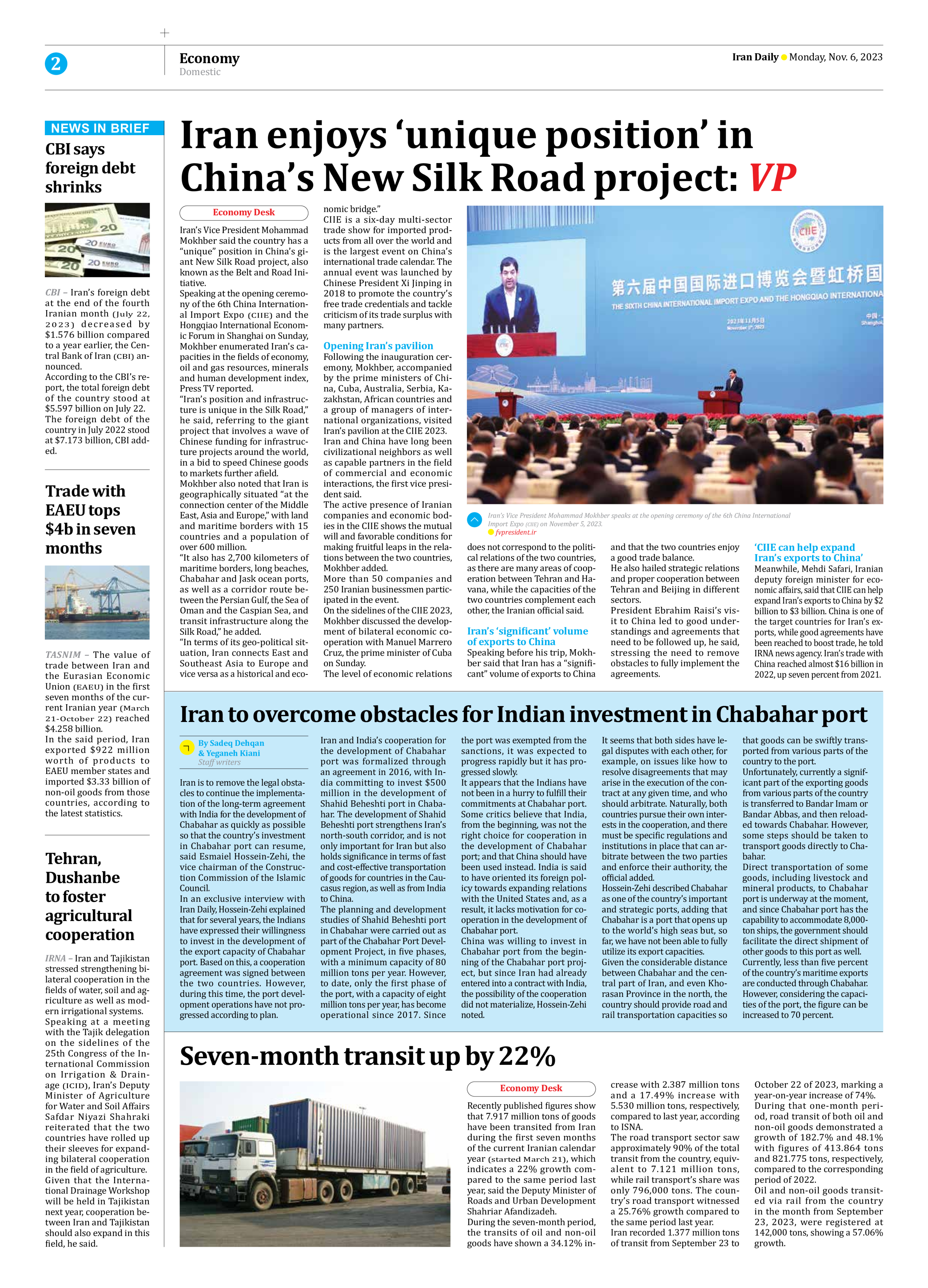
Iran to overcome obstacles for Indian investment in Chabahar port
By Sadeq Dehqan & Yeganeh Kiani
Staff writers
Iran is to remove the legal obstacles to continue the implementation of the long-term agreement with India for the development of Chabahar as quickly as possible so that the country’s investment in Chabahar port can resume, said Esmaiel Hossein-Zehi, the vice chairman of the Construction Commission of the Islamic Council.
In an exclusive interview with Iran Daily, Hossein-Zehi explained that for several years, the Indians have expressed their willingness to invest in the development of the export capacity of Chabahar port. Based on this, a cooperation agreement was signed between the two countries. However, during this time, the port development operations have not progressed according to plan.
Iran and India’s cooperation for the development of Chabahar port was formalized through an agreement in 2016, with India committing to invest $500 million in the development of Shahid Beheshti port in Chabahar. The development of Shahid Beheshti port strengthens Iran’s north-south corridor, and is not only important for Iran but also holds significance in terms of fast and cost-effective transportation of goods for countries in the Caucasus region, as well as from India to China.
The planning and development studies of Shahid Beheshti port in Chabahar were carried out as part of the Chabahar Port Development Project, in five phases, with a minimum capacity of 80 million tons per year. However, to date, only the first phase of the port, with a capacity of eight million tons per year, has become operational since 2017. Since the port was exempted from the sanctions, it was expected to progress rapidly but it has progressed slowly.
It appears that the Indians have not been in a hurry to fulfill their commitments at Chabahar port. Some critics believe that India, from the beginning, was not the right choice for cooperation in the development of Chabahar port; and that China should have been used instead. India is said to have oriented its foreign policy towards expanding relations with the United States and, as a result, it lacks motivation for cooperation in the development of Chabahar port.
China was willing to invest in Chabahar port from the beginning of the Chabahar port project, but since Iran had already entered into a contract with India, the possibility of the cooperation did not materialize, Hossein-Zehi noted.
It seems that both sides have legal disputes with each other, for example, on issues like how to resolve disagreements that may arise in the execution of the contract at any given time, and who should arbitrate. Naturally, both countries pursue their own interests in the cooperation, and there must be specific regulations and institutions in place that can arbitrate between the two parties and enforce their authority, the official added.
Hossein-Zehi described Chabahar as one of the country’s important and strategic ports, adding that Chabahar is a port that opens up to the world’s high seas but, so far, we have not been able to fully utilize its export capacities.
Given the considerable distance between Chabahar and the central part of Iran, and even Khorasan Province in the north, the country should provide road and rail transportation capacities so that goods can be swiftly transported from various parts of the country to the port.
Unfortunately, currently a significant part of the exporting goods from various parts of the country is transferred to Bandar Imam or Bandar Abbas, and then reloaded towards Chabahar. However, some steps should be taken to transport goods directly to Chabahar.
Direct transportation of some goods, including livestock and mineral products, to Chabahar port is underway at the moment, and since Chabahar port has the capability to accommodate 8,000-ton ships, the government should facilitate the direct shipment of other goods to this port as well.
Currently, less than five percent of the country’s maritime exports are conducted through Chabahar. However, considering the capacities of the port, the figure can be increased to 70 percent.







